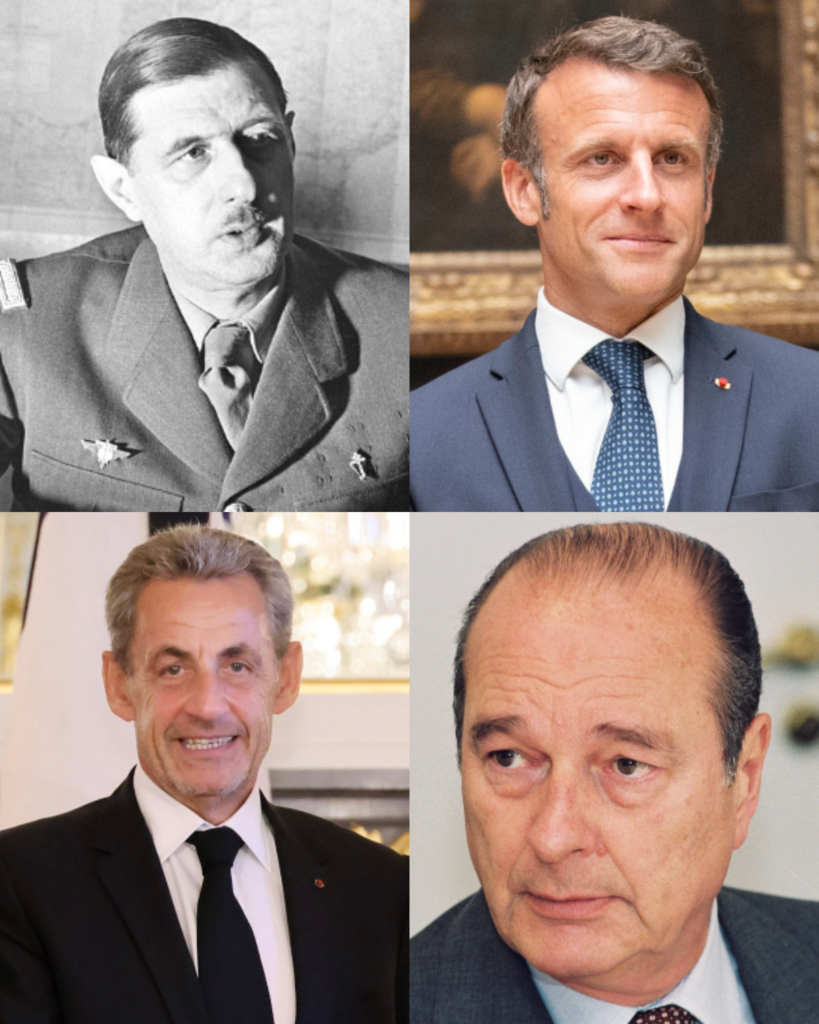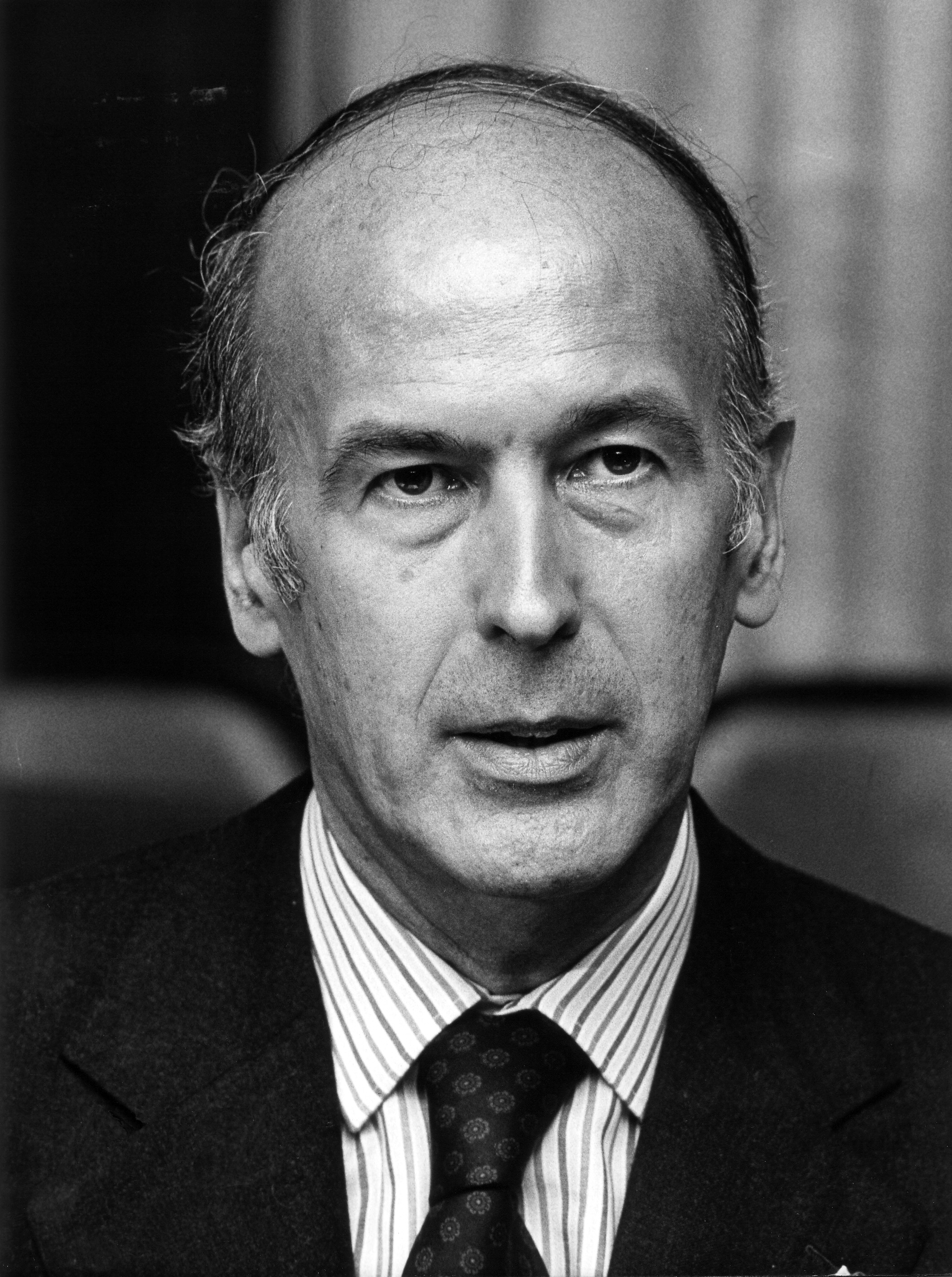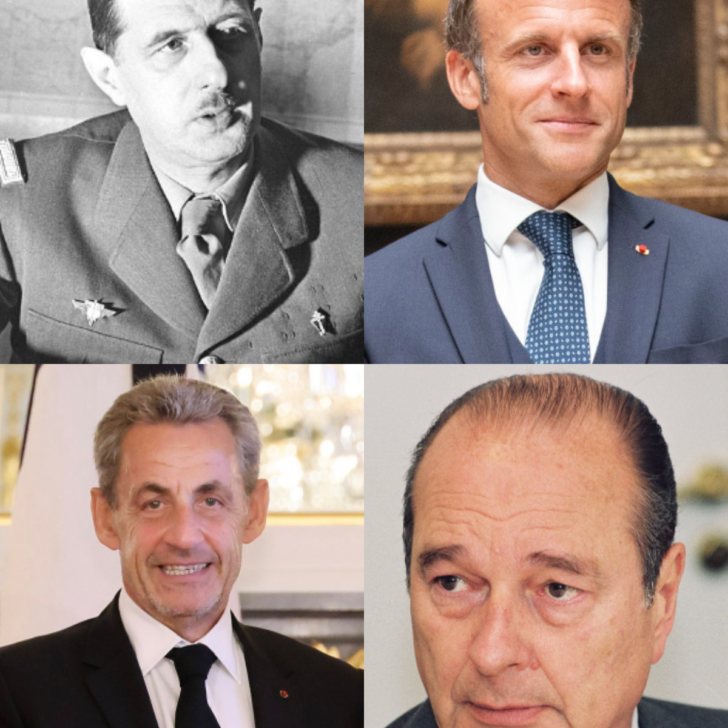Who are the eight most recent French presidents?
Republics and monarchies have come and gone in France’s modern history. Since 1958 though, the Fifth Republic of France has endured. Here’s a look at the French presidents that have defined contemporary France.

The Fifth Republic of France (1958 – today)
In 1958, the Fifth Republic of France replaced the Fourth Republic created after World War II.
Known for weak coalition governments, the Fourth Republic was brought down by the threat of a military coup in Algeria, where dissidents resisted the country’s fight for independence.
The crisis called for radical change. And the man to deliver it was Charles de Gaulle.
The wartime hero who led the Provisional Government of Liberated France came out of retirement to become prime minister. He immediately rewrote the Constitution to create the Fifth Republic.
At its head would be a president with far-reaching powers, supported by a prime minister as head of government.
In 2028, the Fifth Republic will become the longest-surviving political system in France. Only the royal rule of the ancien régime has lasted longer (read about France’s most famous kings).
How many presidents has France had?
There have been 25 presidents of France since 1848. The first was Louis-Napoléon Bonaparte, President of the Second Republic and later Emperor Napoleon III.
Since de Gaulle and the start of the Fifth Republic, there have been 8 presidents, including the incumbent, Emmanuel Macron.
Who are the last presidents of France?
The last presidents of France are:
- Charles de Gaulle 1959 – 1969
- Georges Pompidou 1969 – 1974
- Valéry Giscard d’Estaing 1974 – 1981
- François Mitterrand 1981 – 1995
- Jacques Chirac 1995 – 2007
- Nicolas Sarkozy 2007 – 2012
- François Hollande 2012 – 2017
- Emmanuel Macron 2017 – present
An oft-forgotten ninth president, Alain Poher, enjoyed two brief and unelected spells as acting president after de Gaulle resigned and Pompidou died.
The longest-serving French president
There were two presidents of France in the 1980s. In 1981, Francois Mitterrand replaced Valéry Giscard d’Estaing and would stay in power for 14 years, becoming the longest-serving French president.
The least popular French president
Francoise Hollande, the last French president, is consistently named the least popular of all time.
Charles de Gaulle 1959 – 1969

When the 1958 Algiers Crisis toppled yet another government of the Fourth Republic, Charles André Joseph Marie de Gaulle reentered politics and rewrote the Constitution.
Elected the republic’s first president by an electoral college, seven years later de Gaulle was democratically elected during the first nationwide election.
During his time in office, de Gaulle conceded Algerian independence, neutralizing the threat of a military coup. He later survived multiple assassination attempts by right-wing dissidents opposed to Algerian independence.
De Gaulle also promoted a strong international voice for France, underscored by becoming the world’s fourth nuclear power in 1960.
De Gaulle also oversaw investment in public projects and nationalized industries fueling the Trente Glorieuses (30 Glorious Years), a period of economic prosperity.
Reelected after elections to quell civil unrest in 1968, de Gaulle soon resigned when his flagship referendum to overhaul the Senate failed. A year later, he died suddenly from an aneurysm.
Today, surveys show that de Gaulle remains the most popular French president, frequently identified by historical writers as a savior of France.
To learn more about De Gaulle, consider the book: The General: Charles de Gaulle and the France He Saved.
Georges Pompidou 1969 – 1974

Georges Pompidou was a long-serving prime minister under de Gaulle and his natural successor.
Among his achievements were green-lighting public projects like the TGV high-speed rail network and rebuilding international relations after de Gaulle’s politique de grandeur (politics of grandeur), notably approving British accession to the EEC (twice rejected by de Gaulle).
Pompidou’s Gaullist commitment to modernization was most evident in Paris, where he commissioned the modern art museum that now bears his name and the unloved Montparnasse Tower, then France’s tallest skyscraper.
Fondly remembered for his humble origins and overseeing the tail-end of an age of prosperity, his death in office in 1974 was a shock to the nation.
Valéry Giscard d’Estaing 1974 – 1981

Valéry Giscard d’Estaing, the former French Resistance fighter born in the occupied Rhineland, was relatively young and energetic when elected.
His one-term rule took a socially liberal approach while investing in national projects like the TGV and nuclear energy.
With the help of Simone Veil (one of 12 famous French women we previously wrote about), he legalized abortion, reduced the voting age, and overhauled divorce laws.
Unfortunately, he became French president just after the 1973 oil crisis precipitated a global recession that ended the Trente Glorieuses.
Despite being remembered as the guy in charge when France became poorer, he introduced many milestone laws that changed the social fabric of France.
François Mitterrand 1981 – 1995

François Marie Adrien Maurice Mitterrand is the longest-serving French president and its first left-wing head of state.
During a second term where his party controlled the executive, Mitterrand oversaw significant social changes, including setting a minimum income for nonworking households and extending parental leave.
Taking inspiration from previous French rulers, he also left an architectural footprint via the Grands Projets of François Mitterrand, transforming the magnificent Orsay Museum among many other landmark constructions.
Mitterrand infamously survived numerous controversies, notably wiretapping journalists and bombing Greenpeace’s Rainbow Warrior ship.
In January 1996, shortly after becoming the first president to complete two full terms in the Fifth Republic, Mitterrand died from prostate cancer.
His secret illness was one last controversy (not counting his infamous last meal of Ortolan bunting) from a president who introduced lasting social change.
Jacques Chirac 1995 – 2007

Jacques Chirac, the former mayor of Paris was twice prime-minster and ran for president twice before being elected to the Élysée Palace.
For all his ambition, Chirac did not oversee significant law changes or many major national projects (the Quai Branley Jacques Chirac Museum is an interesting exception).
As an old-style conservative, he is remembered for stability and a program of tax cuts and reduced government spending. And for his pragmatic statecraft, notably refusing to join the 2003 Gulf War.
Above all, he was considered a charming and wily political operator at the forefront of French politics for 50 years.
Although implicated in high-level corruption, Chirac retains a standing in France. Probably a measure of his charisma more than his political achievements.
Nicolas Sarkozy 2007 – 2012

Representing the center-right UMP (Union pour un Mouvement Populaire) of Jacques Chirac, Nicolas Sarkozy was elected on a promise to revive Gaullism.
He also brought a touch of glamor to the Élysée Palace, where he married Carla Bruni in 2008. Unlike her husband, Nicolas Sarkozy’s new wife was already a household name as a successful model turned singer.
Despite support for same-sex civil unions and constitutional reforms, Sarkozy is best-known for his foreign policy. Starting with successful negotiations to release French hostages in Colombia, his presidency ended with military intervention in Libya in 2011.
All the more controversial because he started his presidency by providing arms and support to Libya. Recent corruption trials have also pointed to his party receiving funding direct from Gaddafi.
Although convicted of corruption in 2021, the most serious charge of being under Libyan influence has not been proven. And Sarkozy remains an influential and contentious voice in French politics.
François Hollande 2012 – 2017

Poor old François Hollande is often recalled as the least popular French president ever.
Once part of a Socialist Party power couple with another presidential candidate, Ségolène Royal, Hollande was expected to be a unifying force.
Instead, he is widely considered indecisive for making compromises on domestic policies that pleased nobody.
Some advances were made. He oversaw the first cabinet with 50% female ministers and enacted laws allowing marriage and adoptions for same-sex couples. And he was considered competent when representing France abroad.
But by the end of his first term, his 14% approval rating was far below the floor of any other French president. Reading the room, Hollande decided to not run again.
Emmanuel Macron 2017 – present

Currently serving a second term, Emmanuel Macron is the eighth elected head of the Fifth Republic.
His rise from minor political roles during the Hollande presidency was meteoric.
In 2016, he formed En Marche, a new party offering a break from the old left-right order. One year later, he was a president promising to overhaul the French economy.
Manu (as he calls himself) has overseen France’s response to Covid-19 and reforms to taxes and pensions that have sparked waves of protests, notably the Gilets Jaune (Yellow Vests) movement of 2018.
Macron will have to step aside in 2027. By then, we might be able to properly assess what is shaping up to be the complicated legacy of the 25th French president.

